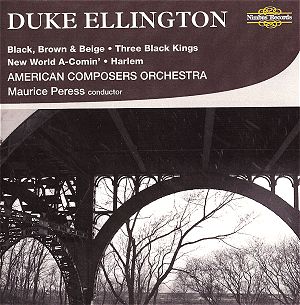1. Black, Brown and Beige Suite
2. Three Black Kings
3. New World A-Comin'
4. Harlem
Maurice Peress - Conductor
Frank Wess - Alto sax (track 1)
Richard Chamberlain - Trombone (track 1)
Jimmy Heath - Tenor and soprano saxes (track
2)
Roland Hanna - Piano (track 3)
Stephen Hart - Clarinet (track 3)
Jon Faddis - Trumpet (track 4)
Bill Easley - Clarinet (track 4)
Ron Carter - Bass (track 4)
Butch Miles - Drums (track 4)
I tend to be wary of symphony
orchestras playing works that were not originally
designed for them. So I steer clear of albums
with titles like "The Royal
Philharmonic Orchestra Plays Queen" as well
as "classical" interpretations of jazz pieces.
However, in the case of the CD at hand, the
four Duke Ellington compositions were originally
devised as large-scale pieces, even if not
written for a symphony orchestra. Ellington
wrote several such ambitious works, particularly
for the concerts which his orchestra gave
at Carnegie Hall in the 1940s.
My
suspicious attitude towards "symphonic" performances
of jazz pieces arises mainly from the simple
fact that most symphony orchestras cannot
"swing" in the way that is second nature to
jazz musicians. Classically-trained musicians
are taught to play exactly what is shown on
the sheet music, whereas jazz players almost
instinctively syncopate the beat to provide
the characteristic feeling of jazz.
This
reservation applies immediately to parts of
the opening Black, Brown and Beige Suite,
where the orchestra's attempts to play jazz
sound jaunty or even laboured rather than
swinging easily. This tendency is partly counteracted
by the orchestra employing some experienced
jazz musicians as soloists. Frank Wess is
listed as playing the alto-sax solo for Come
Sunday in the Black, Brown and Beige
Suite (which consists of three of the
original seven movements), although he is
only heard briefly and is surrounded by sweeping
strings.
Ellington
devised Three Black Kings in 1973 for
the Dance Theatre of Harlem, but it was only
in the form of a short score when Duke died
a year later. It was completed by Duke's son,
Mercer Ellington. Jimmy Heath's wailing soprano
saxophone contributes strongly to the mood
of the piece.
New
World A-Comin' was premiered at Carnegie
Hall in 1943 and it features Sir Roland Hanna
in what is basically a piano concerto. Again,
the string-heavy arrangement obscures the
jazz feeling, although Hanna is allowed at
improvise the cadenza towards the end.
Harlem
is one of Ellington's finest works: a piece
that vividly evokes the predominantly Black
area of New York City. This is the most successful
track on the album, probably because of the
strength of Ellington's original writing,
although the interpretation here cannot match
the excitement of the Duke's own recordings
of the piece.
The
recording details on the sleeve are skimpy,
although it appears that this album was originally
released in 1989 by MusicMasters. The sound
quality and balance are good, and I wish I
liked this CD more. Yet none of the performances
can bear comparison with the sound of the
actual Duke Ellington Orchestra. Nevertheless,
this recording will be valuable if it leads
listeners to gain an inkling of Ellington's
genius. It would be very satisfying if it
makes lovers of "classical" music try listening
to the Ellington band and realise that he
was a serious composer of immense stature
and unmatched invention.
Tony Augarde
